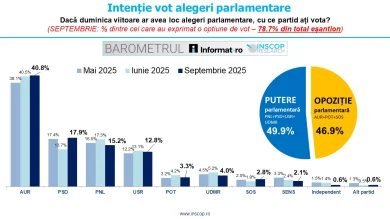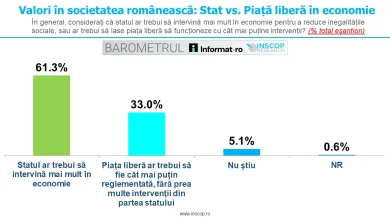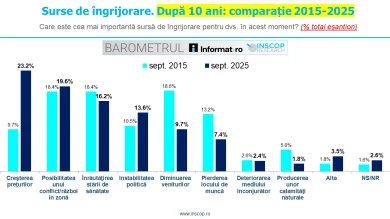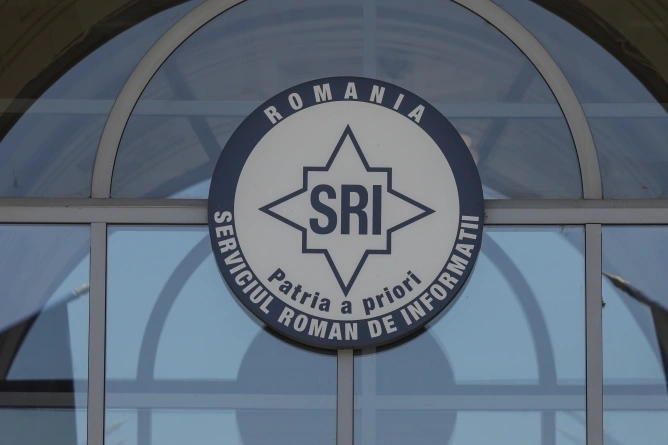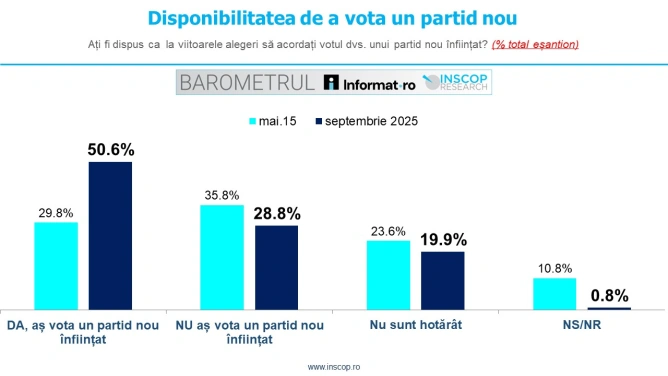
Chapter 7: The Support of Romanians for New Parties
According to BAROMETRUL Informat.ro – INSCOP Research, edition III, conducted between September 1 - 9, 2025, half of Romanians would be willing to cast their vote for a new party established in the upcoming elections.
BAROMETRUL Informat.ro – INSCOP Research is a monthly opinion poll conducted by INSCOP Research on behalf of the news platform Informat.ro in partnership with the Strategic Thinking Group think tank.
BAROMETRUL Informat.ro – INSCOP Research aims to bring to public attention topics of interest to stimulate national conversations about various subjects and essential public policies for the present and future of Romania, based on the opinions of Romanians in partnership with prestigious think tanks and academic institutions. It is an initiative through which we aim to contribute to the strengthening of democracy by using scientific and credible tools that bring the voice of citizens to the forefront of public debate.
Methodology: Data was collected between September 1-9, 2025. Research method: interview via questionnaire. Data was collected using the CATI method (telephone interviews), with a simple stratified sample volume of 1103 people, representative of significant socio-demographic categories (gender, age, occupation) for the non-institutionalized population of Romania, aged 18 and over. The maximum allowable error of the data is ± 2.95%, at a confidence level of 95%.
Graphical presentation of the data is available here: BAROMETRUL Informat.ro - INSCOP Research - The Support of Romanians for New Parties
Remus Ștefureac – director INSCOP Research: "The high level of dissatisfaction among the population regarding the current political parties, highlighted by the 55% of Romanians who declare that they would like their disappearance and replacement with new parties, and 50% who declare that they would vote for a newly established party suggests not only a crisis of trust in the traditional political class but also a desire for a structural reset of the political system, which goes beyond simple dissatisfaction with governance. Moreover, compared to the situation ten years ago, the proportion of those who would vote for a new party has significantly increased, from approximately 30% in 2015 to 50% in 2025, which confirms, at least declaratively, a very high willingness among Romanians to transform their dissatisfaction and frustrations into political action. The demographic profile of those who wish to replace existing parties and would be willing to vote for new ones shows that young people, especially those aged 18-29, but also those aged 30-44, are more dissatisfied with existing parties and more willing to vote for new parties. Similar trends are even more pronounced among private sector employees, individuals with primary education, and AUR voters."
Replacing Existing Parties with New Ones
55.1% of Romanians agree with the statement "All existing parties in Romania should disappear and be replaced with new ones," while 40.7% express disagreement. 4.1% do not know or do not respond.
Among those who agree with the statement "All existing parties in Romania should disappear and be replaced with new ones," 45% are PSD voters, 34% are PNL voters, 33% are USR voters, and 71% are AUR voters, respectively 58% of men and 53% of women, 62% of young people under 30, 58% of those aged 30 to 44, 51% of those aged 45 to 59, and 52% of those over 60. 72% of individuals with primary education, 55% of those with secondary education, 35% of those with higher education, 44% of Bucharest residents, 49% of those from urban areas with over 90,000 inhabitants, 61% of those from small urban areas, and 58% from rural areas, respectively 43% of public sector employees and 57% of those working in the private sector agree with the statement.
They express disagreement with the statement "All existing parties in Romania should disappear and be replaced with new ones": 46% of PSD voters, 64% of PNL voters, 65% of USR voters, and 27% of AUR voters, respectively 39% of men and 43% of women, 37% of young people under 30, 37% of those aged 30 to 44, 44% of those aged 45 to 59, and 43% of those over 60. 22% of individuals with primary education, 41% of those with secondary education, 64% of those with higher education, 55% of Bucharest residents, 49% of those from urban areas with over 90,000 inhabitants, 35% of those from small urban areas, and 36% from rural areas, respectively 53% of public sector employees and 42% of those working in the private sector disagree with the statement.
Willingness to Vote for a New Party
When asked if they would be willing to cast their vote for a newly established party in the upcoming elections, 50.6% of survey participants said yes (compared to 29.8% in May 2015), 28.8% said no (compared to 35.8% in May 2015), and 19.9% are undecided (compared to 23.6% in May 2015). The proportion of non-responses is 0.8%.
They would be willing to cast their vote for a newly established party: 38% of PSD voters, 44% of PNL voters, 50% of USR voters, and 60% of AUR voters, respectively 54% of men and 48% of women, 64% of young people under 30, 57% of those aged 30 to 44, 53% of those aged 45 to 59, and 36% of those over 60. 53% of individuals with primary education, 50% of those with secondary education, 49% of those with higher education, 46% of Bucharest residents, 52% of those from urban areas with over 90,000 inhabitants, 54% of those from small urban areas, and 49% from rural areas, respectively 46% of public sector employees and 60% of those working in the private sector would be willing to cast their vote for a newly established party.
They would NOT be willing to cast their vote for a newly established party: 42% of PSD voters, 34% of PNL voters, 34% of USR voters, and 21% of AUR voters, respectively 27% of men and 30% of women, 18% of young people under 30, 23% of those aged 30 to 44, 27% of those aged 45 to 59, and 40% of those over 60. 26% of individuals with primary education, 31% of those with secondary education, 25% of those with higher education, 26% of Bucharest residents, 31% of those from urban areas with over 90,000 inhabitants, 28% of those from small urban areas, and 29% from rural areas, respectively 25% of public sector employees and 22% of those working in the private sector would not be willing to cast their vote for a newly established party.
They are undecided: 20% of PSD voters, 22% of PNL voters, 16% of USR voters, and 19% of AUR voters, respectively 18% of men and 22% of women, 17% of young people under 30, 19% of those aged 30 to 44, 18% of those aged 45 to 59, and 23% of those over 60. 20% of individuals with primary education, 18% of those with secondary education, 24% of those with higher education, 27% of Bucharest residents, 17% of those from urban areas with over 90,000 inhabitants, 17% of those from small urban areas, and 22% from rural areas, respectively 28% of public sector employees and 17% of those working in the private sector are undecided.
